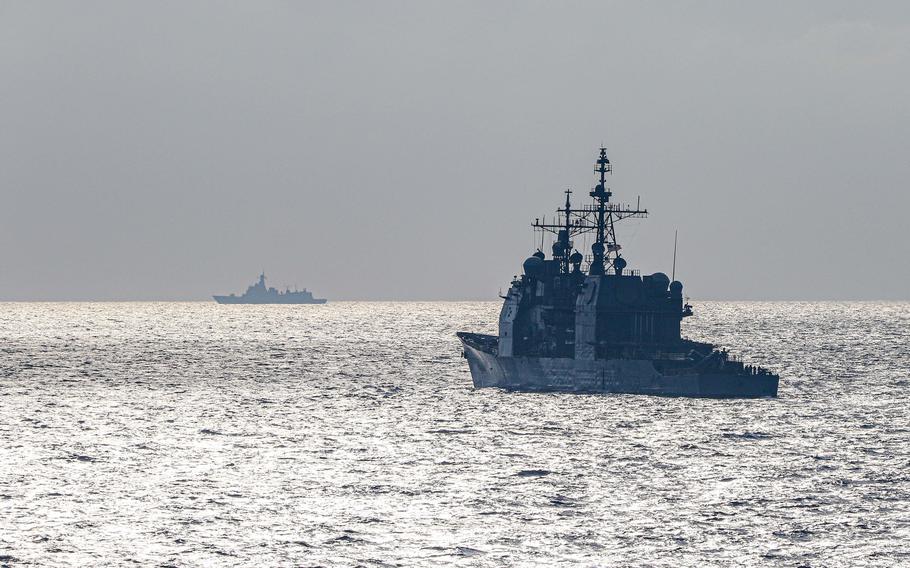
The guided-missile cruiser USS Antietam transits the Taiwan Strait, Aug. 28, 2022. (Justin Stack/U.S. Navy)
A former deputy national security adviser in the Trump administration told lawmakers Tuesday that he could envision a scenario in which China conducts a preemptive strike against the United States ahead of an invasion of Taiwan.
“It's possible,” Matthew Pottinger, now chairman of the FDD China Program at the Foundation for Defense of Democracies, said during a House Select Committee hearing dubbed “The Chinese Communist Party’s Threat to America.”
“We know that the [Chinese army] is training for the likelihood that the U.S. would be part of the fight,” said Pottinger, a former Marine and journalist.
“And that raises the escalatory pressure on China to try to eliminate U.S. capabilities right there in the Western Pacific to buy them time,” he said.
Lawmakers at the hearing — the first held by the newly minted House Select Committee on the Strategic Competition Between the United States and the Chinese Communist Party — brought up numerous flashpoints between the two nations, from Chinese apps the likes of TikTok and WeChat to the purchase of agricultural land in the U.S. by Chinese interests.
But the subject invariably returned to Taiwan and how the U.S. might be drawn into outright conflict with China if Beijing decides to take the island by force.
Chinese leaders consider the island, a self-governing democracy off China’s southern coast, to be a breakaway province that must, at some point, be brought under the control of the Chinese Communist Party.
Retired Lt. Gen. H.R. McMaster, who served as U.S. national security adviser from 2017 to 2018, told the committee that its work was “urgent and important because the United States has fallen behind in the consequential competition with the Chinese Communist Party.”
“For too long, leaders across the private sector, in academia, industry and finance, as well as in the public sector across multiple administrations and Congresses, clung to the assumption that China, having been welcomed into the international system, would play by the rules,” said McMaster, now a senior fellow for the Hoover Institution at Stanford University.
Committee Chair Mike Gallagher, R-Wis., asked McMaster what lessons from the failure to deter Russia from invading Ukraine could be applied to Taiwan.
“I think, first of all, hard power matters,” McMaster said. “And what matters much, much more than pledges of more defense sales, for example, are real capabilities on the ground and integrated, in this case, with the Taiwanese armed force.”
A second lesson is to avoid giving an authoritarian regime “coercive power” over your economy, he said.
“Germany learned that the hard way in the energy sector and Europe did broadly in connection with the Kremlin and Russia,” he said. “But there are all sorts of supply-chain vulnerabilities associated with batteries, magnets, certain minerals — and the upstream processes of producing those minerals — and [much] of the equipment and hardware and a few components that are critical to the energy transmission, for example.”
But most important, McMaster said, is the need for the U.S. to rethink how it builds its defense architecture.
“The assumptions that have underpinned defense planning for a long time have been that we can do one thing at a time,” he said. “And I think what China has been able to do is take advantage of crises elsewhere to advance their interests, through coercion in other places.”
McMaster noted examples such as China’s ongoing border skirmishes with India on the Himalayan frontier and its effort to build and militarize small atolls in the South China Sea.
One committee member asked Pottinger about Chinese President Xi Jinping’s stated goal that the Chinese military possess the capabilities to take Taiwan by force by 2027.
“The [Chinese army] has been receiving massive amounts of investment that increased by double digits in many years, precisely to try to fill gaps that they would need to fill in order to successfully invade Taiwan,” Pottinger said. “That's really what we should be working to prevent, is an invasion.”
Those gaps include amphibious lift to carry tanks and equipment across the strait, helicopters and missiles, he said.
Not to be overlooked, Pottinger said, is China’s need for capabilities “designed to threaten the United States to keep us out of the fight long enough for Xi Jinping to make it a fait accompli.”